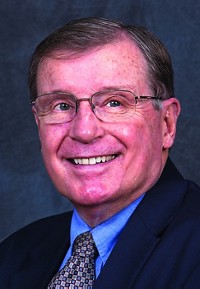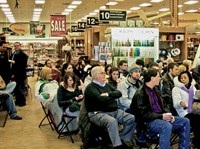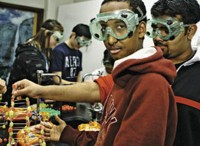Advertisement
Grab your lab coat. Let's get started
Welcome!
Welcome!
Create an account below to get 6 C&EN articles per month, receive newsletters and more - all free.
It seems this is your first time logging in online. Please enter the following information to continue.
As an ACS member you automatically get access to this site. All we need is few more details to create your reading experience.
Not you? Sign in with a different account.
Not you? Sign in with a different account.
ERROR 1
ERROR 1
ERROR 2
ERROR 2
ERROR 2
ERROR 2
ERROR 2
Password and Confirm password must match.
If you have an ACS member number, please enter it here so we can link this account to your membership. (optional)
ERROR 2
ACS values your privacy. By submitting your information, you are gaining access to C&EN and subscribing to our weekly newsletter. We use the information you provide to make your reading experience better, and we will never sell your data to third party members.
Careers
On Tour With ACS Speaker Service
C&EN goes on the road to learn about one of the society's oldest and most beloved volunteer programs
by Linda Wang
November 20, 2006
| A version of this story appeared in
Volume 84, Issue 47

Armed with a good road map and a healthy appetite, former American Chemical Society president Ned D. Heindel set out in late September to crisscross the state of Tennessee. I tagged along for the first half of the trip to witness this ACS Speaker Service veteran and longtime volunteer hard at work.
Our first stop was Memphis, where we joined members of the Memphis Section for dinner at Buckman Laboratories. After dinner, Heindel gave a freewheeling talk about the history of "commercialized quackery."
Our next stop was 160 miles north, in Murray, Ky., where members of the Kentucky Lake Section had gathered for dinner and to hear Heindel give a historical talk about folk medicine in the 19th century. By 9:30 PM, we were on the road again, headed south toward Nashville, where I would catch my return flight to Washington, D.C. Heindel would continue on to Chattanooga, Knoxville, and, finally, Johnson City. By the end of the five-day trip, Heindel had visited five local sections, talked with more than 100 ACS members, and logged 655 miles in a bright orange rented Chevy. He's "off the record" about calories consumed, however.
Heindel is a professor of chemistry at Lehigh University, Bethlehem, Pa., and one of nearly 200 volunteers who travel across the country each year as representatives of the ACS Speaker Service. These "ambassadors of ACS," as Heindel calls them, spend up to six days at a time traveling from local section to local section within a geographic area. Their talks can be either technical or general and can include everything from the chemistry of cheese to the chemistry in the Sherlock Holmes stories.
Begun in 1936 by the Georgia, Florida, and Tennessee Sections, the Speaker Service has become one of ACS's most beloved volunteer programs. "Of all the things I've done, the Speaker Service is one of my favorite activities," says another former ACS president, Helen M. Free, who has been a tour speaker for the past 25 years and, at age 83, is still going strong.
Today, the Speaker Service is made up of 29 tour circuits that include all 189 local sections in the U.S. and Puerto Rico. The Lone Star circuit, for example, covers the Central Texas, Heart O'Texas, Panhandle Plains, Permian Basin, and South Plains Sections. The Peninsula circuit consists of the Orlando, South Florida, Tampa Bay, and Puerto Rico Sections, as well as the Lakeland subsection. And the Alaska circuit is made up of the Alaska Section, which encompasses Anchorage, Fairbanks, and Juneau.
Tour speakers range in age, experience, and area of expertise. There are veterans, such as Heindel, who have been touring for decades and know that for every challenge there is an opportunity. There are the board members, such as ACS President E. Ann Nalley and Immediate Past-President William F. Carroll, who continue to tour despite their frenetic schedules. And there are the new recruits, such as Louisiana Tech University graduate student Malcolm D. Prouty and Judith C. Giordan, vice president of Visions in Education, in Pittsburgh, and professor of practice at the University of Southern Mississippi. Giordan is currently a program director for the Integrative Graduate Education Research & Training Program at the National Science Foundation.

Derek A. Davenport, professor emeritus of chemistry at Purdue University, who toured for more than 30 years before retiring in the mid-1990s, says the Speaker Service has evolved from a group of mostly technical speakers to a group of speakers who appeal to a broad audience.
For example, Heindel's presentation on folk medicine to the Kentucky Lake Section in September drew nearly two dozen undergraduate students from several nearby colleges and universities. First-time tour speakers Lynn M. Hogue and Arlyne (Mickey) Sarquis of the Center for Chemistry Education at Miami University Middletown, in Ohio, spoke in September about using toys creatively in chemistry. Their interactive talk drew 115 people, including many teachers who took the day off from school to attend.
Giordan believes that diversity in topics and in speakers is a real plus. "The greater diversity in age, gender, and experience, the more value you bring to the Speaker Service," she says.
Although the Speaker Service is available to every ACS local section, and about 80% of the sections do use the service, many local section leaders say that small and midsize sections stand to benefit the most from the program. J. Brent Montgomery, chair of the Kentucky Lake Section, a small section, says the service allows his section to bring in high-caliber speakers the section otherwise could not afford. ACS charges sections $300 per speaker visit. "It's a real bargain," Montgomery says.
Local sections can invite as many speakers as they're able to host, and many take full advantage of the service. The Memphis Section, for instance, hosts a different tour speaker for nearly every one of its monthly meetings. The biggest challenge, however, is coordinating with the other local sections in their circuit, because all the sections involved need to agree on a list of speakers for the matches to happen.
Heindel says the Speaker Service is the only connection some ACS members have with the national organization. "Most chemists don't have the opportunity to attend a national meeting, and other than the tour speaker, their councillor has been their only contact with ACS's overall programs." He says he's fielded questions from members about ACS's insurance program, the society's efforts in educating Congress about scientific issues, and even about the society's budget.
For Heindel, the tours provide an opportunity to network and learn about the various "pockets of activity" happening around the country. "I come back with new content for my lectures and new ideas to discuss with my colleagues," he says. During one trip, he adds, he learned about four job openings, information that he later shared with his graduating students.
Heindel maximizes each visit by setting up additional outreach opportunities. While in Memphis, Heindel toured Buckman Laboratories and learned about the company's latest marketing strategy. He also toured St. Jude Children's Research Hospital, where organic chemist R. Kiplin Guy took him through the hospital's new chemical biology and therapeutics department. Kara Jackson, research recruiter for St. Jude, says by taking the time to visit, Heindel shows he cares about the community.

Free says she makes time on her tours to have lunch with the local women chemists group and female faculty members and students. She also talks with medical students and medical technologists.
Local sections that exceed expectations in hosting a speaker, for example, by setting up these additional outreach activities, can be nominated for the Hospitality Award, which is presented at each spring national meeting.
During the fall national meeting in San Francisco, about 35 volunteer speakers and 10 local section planners gathered for a lunch to share ideas and brainstorm ways to improve the program. Many volunteers gave this advice: Plan for the unexpected. One speaker recalled having to give a talk in the dark when the power went out. Another speaker recalled missing both flights to his destination but arriving at his talk only 15 minutes late.
"I gain a great deal just by listening to all the words of wisdom from veteran speakers," says Giordan. "We don't get to see each other often, and the luncheons are a wonderful opportunity to get together and learn from each other."
Giordan embarked on her first tour, of the Prairie circuit, earlier this month and talked about high-tech entrepreneurship and building a personal career. Although she has been active in ACS for many years, she says, she has waited until this year to join the Speaker Service because she now has more time and more knowledge to share. "I've gotten an experience base from which I can now draw to bring forth some unique topics that 10 or 15 years ago I wouldn't have had," she says.
Prouty, who will be doing his first circuit in February, is the youngest speaker and the first graduate student to participate. He admits that he'll likely get nervous the night before the trip, but he says he's excited about going. "I'm hoping that I do a good job, and I really appreciate the chance to share what I do and make some good contacts," he says. He adds that the exposure may open doors for him when he begins his search for postdoctoral and faculty positions. Prouty will be talking about his research on a layer-by-layer nanoengineered magnetic encapsulation system for drug delivery.
"Very few graduate students have the courage to stand up and do this, and those who do, that's spectacular," Giordan says. She encourages local sections to advertise that a graduate student is speaking to attract more students.
The Speaker Service will celebrate its 75th anniversary in 2011. As it moves toward this milestone, Debra A. McLaughlin, ACS membership associate and manager of the Speaker Service, is beginning to experiment with Web-based technologies such as podcasting. She says she hopes to have sample speaker presentations available online to local section planners by the end of the year.
When Heindel returned from the Tennessee circuit, he reflected on the places he visited, the people he met, and the things he learned-including the little-known fact that there stands a replica of the Eiffel Tower in Paris, Tenn. Things like that make every trip an adventure.





Join the conversation
Contact the reporter
Submit a Letter to the Editor for publication
Engage with us on Twitter